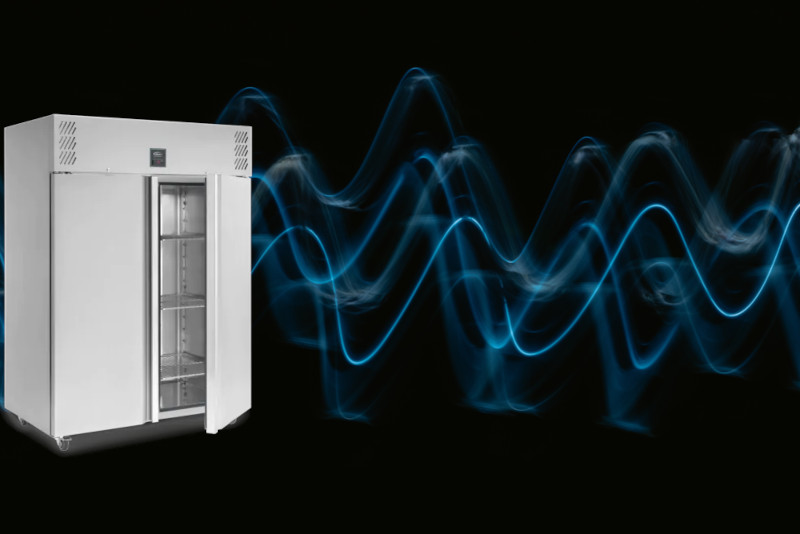
What's Normal & Why is it Louder than Domestic?
Working in a commercial kitchen is noisy; there's no getting away from the raised decibels of busy, energetic staff, but commercial-grade refrigeration equipment will also add to the commotion. Commercial fridges, freezers and cold rooms are louder than domestic models, but why is this?
We understand that catering refrigeration can be a significant investment and making the right choice is vital. Read on for information about the regulations surrounding noise pollution from commercial refrigeration, what type of commercial fridges and freezers are available, and why they can be louder than domestic models.
Regulations for Commercial Refrigeration Noise Levels
Anyone who has worked in hospitality or catering will know the increased noise that comes with industrial-grade refrigeration equipment. Manufacturers design industrial components to work harder, be more robust and produce more powerful results. As a result, the noise levels can be much higher than regular domestic fridges.
The government sets out the UK regulations surrounding noise pollution for commercial refrigeration in EN ISO 3744:2010 – Acoustics. EN ISO 3744:2010 lays out the measurement of sound insulation in buildings and associated elements, along with an engineering method for an essentially free field over a reflecting plane.
The standard limits the sound emitted from commercial refrigeration equipment and tests at various frequencies between 125 Hz and 4 kHz (cycles per second). In addition, many manufacturers will go above and beyond these standards during testing to ensure their products have the best possible performance when reducing noise pollution.
The decibels that commercial refrigeration generate may typically range between 45dB – 75dB as opposed to domestic levels of roughly 32dB – 47dB depending on the unit. This commercial reading, however, is only a general guide; the decibels may increase or decrease depending on the type, function and size of equipment.
It's worth pointing out that noise pollution testing is based on use in commercial premises and associated environments and not domestic situations.
Things to Consider When Installing Remote Refrigeration Systems
In a commercial environment, it's worth considering remote systems and noise pollution. The part of the refrigeration system that sits on the exterior of the building will generate noise throughout its operation, and the noise you can hear inside your premises. Additional noise means you must consider the positioning of the unit on the exterior wall when planning an installation and any regulations regarding distance from neighbouring buildings, especially in residential areas.
Problems with Putting Commercial Refrigeration in Domestic Areas
While increased noise levels aren't necessarily a problem in busy kitchens, shops or bar settings where ambient noise is often louder, it may cause issues in other environments - predominantly domestic.
Domestic refrigeration will only undergo ocassional use, such as getting the milk out for a cuppa, and therefore components don't have to work as hard to maintain the correct temperature. This will result in quieter operation as the refrigeration doesn't undergo excessive stress or pressure to perform. Commercial refrigeration has to work so much harder, not only due to the size of the equipment and the increased content capacity but also with doors being frequently opened and for longer periods while produce is retrieved during busy services. Components have to work harder to maintain fridge or freezer temperatures and therefore will generate more noise.
People often want to buy commercial bottle coolers and commercial wine coolers for home, thinking that the product will be better quality…yes it is, but it also comes with the noise of a commercial piece of refrigeration. The increased operational noise of commercial refrigeration will be noticeable.
Increased noise may also cause issues in quieter areas such as meeting rooms and offices. Noise level and volume can be influenced by the size of the room, the decor, also the types of walls. For instance, many modern builds don't have brick built walls, only insulated plasterboard room divides.
The type of flooring in domestic or quieter business properties is also a consideration; carpet is noise insulating, whereas wooden floors can reverberate noise. Furniture positioning makes a difference as a minimalist room can quickly reflect and absorb more sound, causing echoes and reverberations, further increasing the noise level. More noise becomes incompatible with areas designed initially for quiet working over time.

When Excessive Noise Can Signal a Problem
If you notice an increase in noise levels beyond your expectations, it's worth checking to ensure the refrigeration system functions correctly and that expected temperatures are being achieved. As a best practice, regularly clean, check and maintain your commercial fridges. If there is any sign of problems or potential faults, call an engineer and get it checked out.
The regulations surrounding noise pollution for commercial refrigeration are strict, and manufacturers stringently test their products to ensure they meet the requirements for a commercial business environment. If you're planning an installation, it's worth considering the layout and intended positioning of remote systems as they can be noisy and regulations may dictate where exterior units can be placed. It's also important to remember that commercial units are generally not suitable for domestic use due to increased noise levels.
If you notice an increase in noise levels, check your equipment and call an engineer if necessary. It's always better to have a safe rather than sorry attitude when keeping your commercial refrigeration and business running smoothly.

Leave a Comment
Your email address will not be published. Required fields are marked *